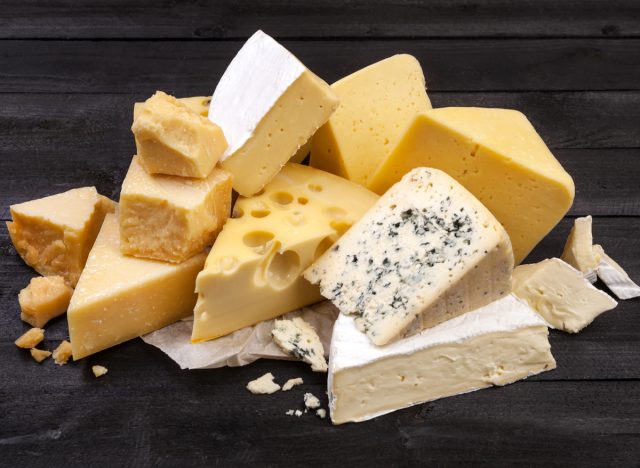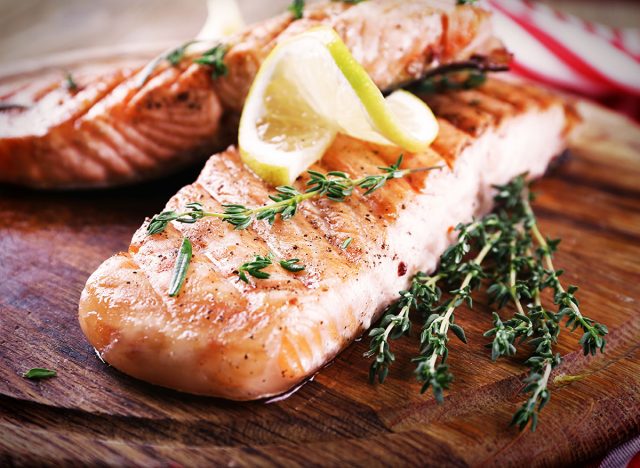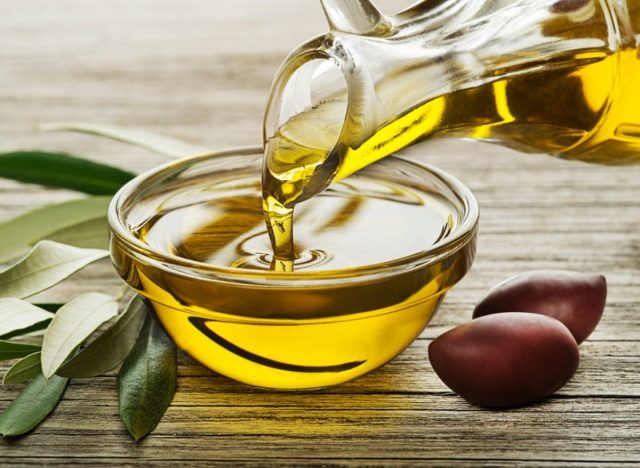5 Best Foods To Eat for Achy Bones, Say Dietitians

If your body is feeling off, and your joints and bones feel sensitive or weak, there could be an underlying issue. Most of the time, it could be from an illness like the flu, and in time it will go away. However, the discomfort could also be from arthritis or even bone loss, which are more temporary problems. Although medicine and supplements would help fight these ailments, trying to change your diet could also be helpful.
According to Amy Goodson, MS, RD, CSSD, LD, author of The Sports Nutrition Playbook, it’s important to note that bones and joints are not the same things, and foods won’t magically help either problem.
“There are foods, that when eaten consistently over periods, may help fight inflammation and thus reduce the chance of joint pain caused by inflammation, but no foods reduce pain, says Goodson. “When it comes to bones this is especially true. There are foods, that when eaten consistently, can help you keep your bone density strong, but none that help bone pain or make it go away.”
Read on to see the foods that can help either fight inflammation and/or keep your bone density strong. Then, be sure to check out 5 Best Recipes to Prevent Aging Bones, Says Dietitian.
Milk

If you’re looking to lay a foundation for strong bones, don’t underestimate the power of cow’s milk.
“Believe it or not, a simple glass of cow’s milk is one of the best ways to keep your bones strong,” says Goodson. “One 8-ounce glass of milk provides you with 13 essential nutrients, including approximately 300 milligrams of calcium.”
Goodson further explains that the Dietary Reference Intake (DRI) of calcium for adults aged 19-50 years old is 1,000 milligrams per day. Therefore, consuming three servings of dairy foods, specifically, milk, can help reach that goal.
“What’s important to note is that while men aged 51-70 years old still only need 1,000 milligrams of calcium per, women actually have increased calcium needs to maintain bone mineral density and should consume 1,200 milligrams per day,” Goodson explains. “Then after age 70, men and women should both be consuming 1,200 milligrams of calcium per day.”
Goodson continues by saying that milk is also fortified with vitamin D, containing 100 international units per 8-ounce glass.
“Vitamin D is essential for calcium absorption,” suggests Goodson. “In fact, without adequate vitamin D intake, you only absorb about 10-15% of the calcium you take in from your diet. Not to mention, milk contains other nutrients that help with bone and tissue growth like phosphorus and high-quality protein.”
If you’re not a fan of drinking cow’s milk straight from a glass, there are other ways to incorporate this inexpensive dairy into your diet. Goodson shares trying it in iced lattes or smoothies, which will help you hydrate as well as keep your bones strong as you age.
Cheese

Cheese is a calcium-rich food that can you can find in the dairy aisle.
“Dairy foods are the best sources of calcium in the American diet,” explains Goodson.
Cheese is not only a great source of calcium, but it’s also great for fats and protein. It also contains high amounts of vitamins: vitamin A—needed to stimulate the production and activity of white blood cells and to take part in remodeling bone—and vitamin B12—needed to form red blood cells and DNA. It is also a key player in the function and development of brain and nerve cells.
Goodman also suggests that 1.5 ounces of cheese will provide you with approximately 300 milligrams of dairy in your daily diet as well.
Fatty fish

Don’t let the term, “fatty” scare you. Fatty fish, also known as oily fish, is filled with omega-3 fats.
“Omega 3s are known to help tamp down inflammation around joints that leads to pain and stiffness,” says Julie Upton, MS, RD.
Examples of fatty fish include sardines, tuna, and salmon.
“Salmon provides omega-3 fats and has been shown to help reduce inflammation, which is why some folks may have pain in the bones or joints,” says Toby Amidor, MS, RD, CDN, FAND award-winning nutrition expert, and Wall Street Journal best-selling author of The Family Immunity Cookbook.
Although Upton suggests that the best sources are fatty fish, she states you can also get omega-3 fats in walnuts and flaxseeds.
Yogurt

Another dairy product that provides an ample amount of calcium to help lay a foundation for strong bones, yogurt makes for a great breakfast, snack, or addition to a meal.
Goodman says that three-fourths cup of plain yogurt is enough to meet that 300 milligrams mark of dairy in your daily intake as well.
Potentially removing yogurt from your diet can lead to a decrease in your protein intake as well, which can contribute to a weakening of the bones.
However, when choosing which yogurts to incorporate, be sure to find ones low in sugar, as higher sugar yogurts cause other problems such as inflammation, weight gain, and being at risk for heart disease.
Olive oil

According to Amidor, olive oil is a source of monounsaturated fats that has been linked to helping decrease inflammation.
Consuming extra virgin olive oil (EVOO) has been shown helped reduced inflammatory biomarkers associated with atherosclerosis– the hardening of arteries due to plaque buildup. Plus, EVOO has anti-inflammatory properties similar to ibuprofen. This is due to its phenolic compound of oleocanthal.
However, although brimming with benefits, Amidor you should only be consuming olive oil in moderation.
“Be careful, as calories are 120 per tablespoon,” says Amidor. “Opt for using 1 tablespoon per serving in recipes to help keep calories under control.”









